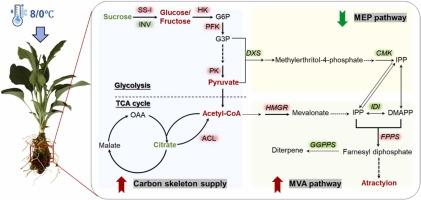通过甲戊酸途径增强碳主链供应,使低温条件下苍术根茎中倍半萜积累
IF 6.2
1区 农林科学
Q1 AGRICULTURAL ENGINEERING
引用次数: 0
摘要
虽然中等温度胁迫可以丰富药用植物的特定成分,但其对苍术次生代谢的影响更大。(A. macrocephala)仍然未知。从1年生根茎中提取的2月龄大头马植株在盆栽中生长,暴露于8/0°C、16/8°C和40/32°C的昼夜温度下,28/20°C作为对照。处理8 d和12 d后,8/0°C使根茎中可进一步转化为苍术内酯的倍半萜类化合物苍术酮的含量分别提高了51.0% %和44.8% %,超过了根茎生物量的下降幅度。这一发现表明这种富集是由生物合成诱导引起的,而不是由于生长抑制引起的浓度效应。在8/0°C条件下,负责蔗糖水解、糖酵解和柠檬酸循环的主要酶活性增加,表明初级碳代谢改善,为萜类主链合成提供了充足的乙酰辅酶a池。转录组学分析显示,8/0°C上调羟甲基戊二酰辅酶a还原酶(HMGR)基因,下调甲基四醇-4-磷酸途径基因,促进甲羟戊酸途径的碳通量。此外,8/0°C升高了法尼基二磷酸合成酶基因的表达,但降低了香叶基香叶基焦磷酸合成酶基因的表达,使前体被分配到倍半萜的生产中。因此,8/0°C通过优化前体供应和转移代谢通量,促进苍术酮在大头天根状茎中的积累。本研究为提高大头蛇药材质量提供了新的思路。本文章由计算机程序翻译,如有差异,请以英文原文为准。

Enhanced carbon backbone supply via the mevalonate pathway confers sesquiterpene accumulation in Atractylodes macrocephala rhizomes under low temperature
Although moderate temperature stress can enrich specific ingredients in medicinal plants, its effect on the secondary metabolism of Atractylodes macrocephala Koidz. (A. macrocephala) remains unknown. Two-month-old A. macrocephala plants derived from one-year-old rhizomes were grown in pots and exposed to day/night temperatures of 8/0°C, 16/8°C, or 40/32°C, with 28/20°C as the control. Following 8 and 12 days’ treatment, 8/0°C increased the content of atractylone, a major sesquiterpene that could be further converted to atractylolides, in rhizomes by 51.0 % and 44.8 %, respectively, exceeding the decline in rhizome biomass. This finding indicates that such enrichment resulted from biosynthetic induction rather than concentration effects due to growth inhibition. Increased activity of major enzymes responsible for sucrose hydrolysis, glycolysis, and the citrate cycle at 8/0°C indicated improved primary carbon metabolism, providing adequate acetyl-CoA pools for terpenoid backbone synthesis. Transcriptomic analysis showed that 8/0°C upregulated hydroxymethylglutaryl-CoA reductase (HMGR) genes while downregulating methylerthritol-4-phosphate pathway genes, facilitating carbon flux to the mevalonate pathway. Furthermore, 8/0°C elevated farnesyl diphosphate synthase gene expression but reduced geranylgeranyl pyrophosphate synthase gene expression enabled precursors to be allocated to sesquiterpene production. Therefore, 8/0°C promotes atractylone accumulation in A. macrocephala rhizomes by optimizing precursor supply and diverting metabolic flux. This work provides novel insights for improving the medicinal quality of A. macrocephala.
求助全文
通过发布文献求助,成功后即可免费获取论文全文。
去求助
来源期刊

Industrial Crops and Products
农林科学-农业工程
CiteScore
9.50
自引率
8.50%
发文量
1518
审稿时长
43 days
期刊介绍:
Industrial Crops and Products is an International Journal publishing academic and industrial research on industrial (defined as non-food/non-feed) crops and products. Papers concern both crop-oriented and bio-based materials from crops-oriented research, and should be of interest to an international audience, hypothesis driven, and where comparisons are made statistics performed.
 求助内容:
求助内容: 应助结果提醒方式:
应助结果提醒方式:


